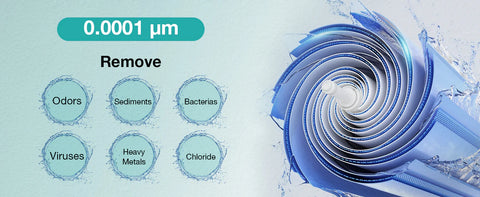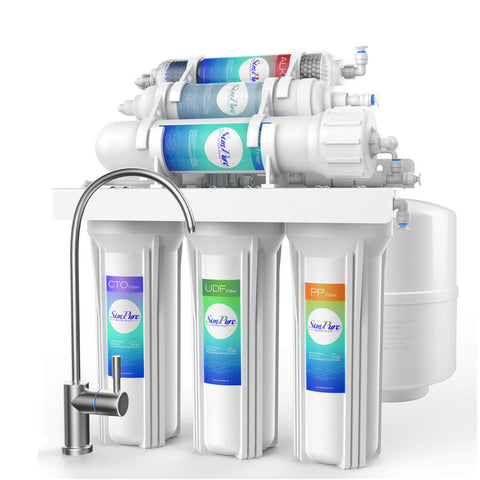Recently, there has been an ongoing debate on whether reverse osmosis water dehydrates you. Reverse osmosis is a popular water purification method that has gained immense recognition worldwide thanks to its impressive water filtration capabilities.
While reverse osmosis water is completely pure of contaminants and has better water quality, it could be lacking essential minerals that hydrate us. Many people are split over this debate with some favoring it and others being skeptical about its hydration capabilities.
Let’s dig deeper into this aspect of whether does reverse osmosis water dehydrate you and see if this is a myth or indeed, fact.
What is Reverse Osmosis Water?
Reverse osmosis is a water purification procedure that uses a semi-permeable membrane to filter out unnecessary molecules and large solvents like contaminants and sediments from water. RO also filters out microorganisms such as bacteria, making water drinkable and safe for use.
The reverse osmosis system commonly involves four stages of filtration, a sediment filter, pre-carbon block, reverse osmosis membrane, and post-carbon filter. During reverse osmosis, the sediment filter removes large particles like dirt, sand, and rust to prevent clogging of the other filters. The pre-carbon block involves using activated carbon to filter microparticles and bonding with positively charged ions to prevent compounds like chlorine from passing through to the next filter.
Then, the reverse osmosis membrane filters out molecules heavier than water, such as lead, sodium, or fluoride. Finally, the post-carbon filter completely eliminates the remaining contaminants, rendering water completely pure. 1
Common Uses of RO Water
Reverse osmosis water is not just beneficial for health, but it has applications in various industries, such as:
Agriculture
Reverse osmosis water is mainly used in agricultural settings. The performance of pesticides depends on water quality. Due to poor water quality, the solubility of pesticides decreases which increases the absorption of harmful substances, causing the pesticide spray to under-perform. This leaves the crops vulnerable to pests. Therefore, reverse osmosis water is used to make pesticide treatment more effective. 2
Aquariums
Reverse osmosis water is also beneficial in aquariums. Poor water quality may affect marine life, so it needs to be filtered via reverse osmosis. Water having contaminants like fluoride or chlorine is dangerous for fish. Hence, water needs to constantly be filtered to sustain fish. With reverse osmosis, water becomes 99% free of contaminants, making it useful for aquariums. Learn more about reverse osmosis systems here.
Does Reverse Osmosis Water Dehydrate You?

Does reverse osmosis water dehydrate you? Well, yes. Reverse osmosis water is completely pure as it undergoes rigorous filtration processes that remove up to 99% of contaminants, including electrolytes and essential minerals like sodium, zinc, calcium, potassium, magnesium, etc., that are needed by our body for various processes.
While RO water doesn’t directly dehydrate you, its lack of minerals and electrolytes makes you feel dehydrated even after consuming plenty of water. Electrolytes are essential for hydration and their absence can make you feel thirsty.
-
The Hydration Process
Hydration is essential for our health as it ensures optimal nutrient absorption in the digestive system. Water transports nutrients from the digestive system into the bloodstream (check this blog Digestion of Water for details). When you keep yourself hydrated, your body can efficiently absorb various nutrients and essential minerals. 3
Water is essential for digestion as it begins in the mouth where saliva (which is primarily water) facilitates the movement of food along the digestive tract. As the food passes through the tract, it needs water for smooth movement. Once it reaches the stomach, water combines with stomach acids to break down food into essential nutrients.
Water also softens the stool and promotes easy digestion, preventing constipation. Conversely, dehydration disrupts the digestive process as lack of water leads to dry stools and ultimately constipation.
-
Myths and Facts
Let’s address the common misconceptions surrounding whether does reverse osmosis water dehydrate you. 4 The first misconception about RO water is that it removes all healthy minerals. This is not entirely true as the extent of mineral removal depends on various factors including the type of RO system and its configuration.
While RO does remove minerals, it also removes harmful contaminants like fluoride and chloride which are included in the list of water-borne contaminants by the Water Quality Association.
Another misconception surrounding RO water is that it changes the pH levels of water. However, in reality, the pH is influenced by various factors and is not solely determined by RO. Water from different sources has varying pH levels due to factors like geology, or the presence of carbon dioxide in water. Water treated through reverse osmosis has a neutral pH, close to 7 which is considered safe for consumption. These days, RO systems have special features to adjust the pH level of water and restore minerals like SimPure T1-400 ALK RO system with remineralization.
Why Do I Feel Thirsty After Drinking Reverse Osmosis Water?
If you are thinking about whether does reverse osmosis water dehydrate you, then the answer is to some extent. If you are feeling thirsty after drinking RO water, the reason could be the lack of electrolytes. Since reverse osmosis filters all sorts of contaminants including essential minerals from water, it renders water 99.99% pure.
Consuming such water without having a proper healthy diet may dehydrate you and make you feel thirsty and lethargic despite drinking water. Therefore, if you are consuming RO water, you must consume foods rich in electrolytes and minerals and you won’t feel thirsty ever again.

The type of water you consume has a pivotal influence on your health. If you are consuming water of poor quality, you’ll be consuming contaminants that are potentially dangerous to your health.
If you are consuming 100% pure water, you are depleting your body of essential minerals and electrolytes that are essential for muscle contractions, and nerve impulses. Therefore, you should hydrate yourself properly by consuming a balanced diet and drinking clean water.
Is Reverse Osmosis Water Good for Hydration?
Now that you have understood the impact of RO water on hydration, you must know that it may not be ideal for complete hydration. This is because it lacks essential minerals and electrolytes needed for hydration.
Factors Affecting Hydration
- Water quality and its impact
Reverse osmosis water is completely free of contaminants like dirt, debris, or chemicals. This enhances the water quality and makes it safe for use. Consuming RO water means that you are consuming 100% pure water which is good for your health.
-
Presence of minerals in water
RO water is devoid of essential minerals that are needed to sustain our health. This is a downside as the lack of minerals and electrolytes affects our health and makes us feel dehydrated and lethargic.
-
Taste and its influence on water consumption
Since RO water lacks minerals and other impurities, it tastes flat which makes it less appetizing than normal tap water. This may affect water consumption as people find unfiltered water more refreshing.
Best Solution: Balance Mineral Intake with SimPure RO Water with Remineralization

Since RO water lacks minerals and tastes flat, it may lead to dehydration and less water consumption. Well, not anymore as there are modern reverse osmosis systems with remineralization capabilities like the SimPure T1-400 ALK or the SimPure T1-6 Reverse Osmosis Systems that restore healthy minerals and produce a balanced alkalinity thanks to their durable alkaline water filters. Learn more about remineralizing RO water here.
SimPure T1-400 ALK RO system is an 8-stage alkaline + UV RO water filtration system that restores essential minerals, making RO water healthy and safe for consumption. If you are concerned about feeling dehydrated after drinking RO water, you should rest assured that you won’t face dehydration again thanks to the remineralization filter.
SimPure T1-6 Reverse Osmosis System is a 6-stage RO system that increases antioxidants and natural minerals in water, making it ideal for consumption. By consuming RO water produced via these RO systems, you can never feel dehydrated again or face the issue of flat taste.
If you are wondering how to add minerals to RO water, give this blog a read.
Conclusion
We hope you have gotten an idea on whether does reverse osmosis water dehydrate you. While RO water lacks essential minerals and electrolytes, it does not entirely dehydrate you and is effective for hydration. It is important to have a balanced diet to get essential minerals and consume RO water to drink 100% clean and pure water. You may consider using SimPure RO systems with remineralization capabilities to restore healthy minerals and make RO water highly effective for complete hydration.
Explore SimPure RO systems Now!
Sources


